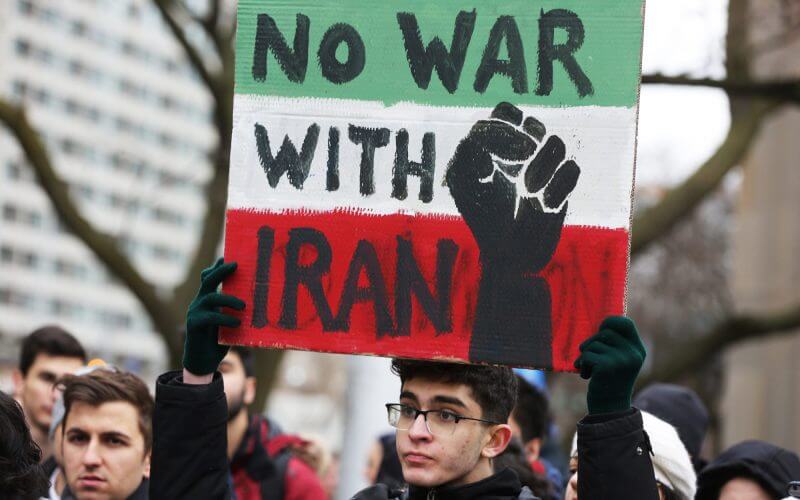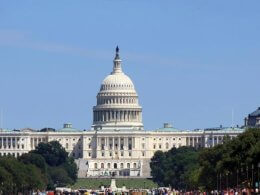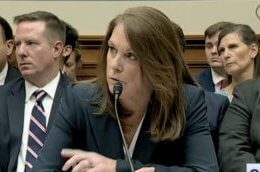The Islamic Republic of Iran's former foreign minister Mohammad Javad Zarif went on the social-network platform Clubhouse Tuesday to talk about topics ranging from his time working in the Islamic government, the Iran nuclear agreement, Iran's relations with the international community, and other wide-ranging subjects.
During the Clubhouse meeting, Zarif addressed the subject of pro-Islamic Republic-based political organizations in the United States and elsewhere, saying that the National Iranian American Council (NIAC) did not receive a "single penny" from Tehran while simultaneously defending his cooperation with the organization as "limited" with regards to exchanging information.
Zarif said there were in fact pro-regime lobbyist groups in the U.S. that were sponsored by the Islamic Republic, confirming what many believed to be the case.
Since its inception, NIAC has expressed sympathy towards the Islamic Republic, supporting the 2015 Iran nuclear agreement and encouraging the U.S. not to act against Iran-backed Syrian President Bashar al-Assad, even after its regime used chemical weapons against civilians during the Syrian Civil War.
NIAC officials have been photographed with Iranian diplomats, and founder and former president Trita Parsi was found to have encouraged the former Iran ambassador to the United Nations to meet with Democrats in Congress.
"NIAC's ties to the Islamic Republic have long been public knowledge. Now that the truth has been exposed, it is a largely defunct organization, so we do not spend much time thinking about it," said Cameron Khansarinia, Vice President of the National Union for Democracy in Iran (NUFDI).
Speaking to The Foreign Desk, Khansarinia said that organizations like NUFDI are "busy working on engaging and mobilizing Iranian Americans for our community's top priority: advancing a U.S. foreign policy that supports human rights and democracy in Iran."
Zarif went on to say that during his tenure, the then Islamic Revolutionary Guards Corps (IRGC) Intelligence Officer Hossein Taeb and other hardliners in the government tried to link him to NIAC, given that the organization had critical stances on the condition of human rights in Iran.
Zarif then discussed the 2015 nuclear agreement between Iran, the U.S., and Europe, revealing new information about past talks and where negotiations stand today. On Twitter, one user posted a recording of Zarif saying that in the past four years, Tehran has not complied with any of its obligations made during the 2015 nuclear agreements.
Zarif noted that during the nuclear talks, Iranian officials sent transcripts of all negotiations and proceedings to Supreme Leader Ayatollah Ali Khamenei, who would provide his input and, in certain instances, express opposition on certain items. The former Islamic Republic Foreign Minister also addressed Israel's role in opposing the 2015 nuclear agreement, arguing that had the Israeli government been worried about Tehran obtaining an atomic weapon, it should have supported the 2015 nuclear agreement but still managed to prevent the regime from acquiring one.
Zarif went on to say that the threats issued by former Iranian President Mahmoud Ahmadinejad against Israel helped push the issue of Iran's nuclear program in Israel's favor.
To keep the Iran nuclear program alive and well, then-U.S. Secretary of State John Kerry and Zarif created economic benefits for the U.S., prompting then-U.S. President Obama to issue an executive order to allow the Islamic Republic to purchase civilian airplanes from Boeing and Airbus for humanitarian reasons. Secretary Kerry also proposed allowing foreign branches of U.S. companies to invest in Iran, guaranteeing U.S. economic benefits from the JCPOA.
According to Zarif, Iran only accepted $13 billion worth of investment offers out of $85 billion applications.
Regarding the Trump administration, Zarif claimed that officials ranging from Secretary of State Mike Pompeo to National Security Adviser John Bolton steered then-President Trump into leaving the 2015 nuclear agreement.
On where negotiations stand today, Zarif said there is no chance of achieving a deal better than the 2015 version.
Should the 2015 nuclear agreement not be revived, nothing would be able to meet the demands of Western negotiations, Zarif said.
Related Story: Leaked Documents Show Iran Plotting to Increase Attacks Against U.S. Troops in Syria










